
It’s the final stretch of negotiations at the United Nations climate change summit, COP21, as representatives from nearly 200 countries attempt to reach a final deal before the weekend. A draft text released Wednesday has nearly 100 outstanding points of disagreement that still need to be resolved, including the role that wealthy and more advanced developing countries should play in helping vulnerable nations cope with the impacts of climate change. Civil society groups attending the summit erupted in protest over Wednesday’s draft, saying it will not go far enough to prevent catastrophic global warming. Hundreds staged a sit-in and march, marking the largest protest inside COP21 to date. “It’s completely unacceptable,” Dipti Bhatnagar of Friends of the Earth International said of the draft. “It’s going to burn our planet. It’s going to drown our Pacific islands.”
Transcript
AMY GOODMAN: This is Democracy Now!, democracynow.org, The War and Peace Report. We’re broadcasting live from the COP21 here in Paris, France. We’ve entered the final stretch of negotiations at the U.N. climate change summit as representatives from nearly 200 countries attempt to reach a final deal before the weekend. On Wednesday, a near-final draft was released. The text, pared down to 29 pages from a 43-page document, contains about a hundred decisions still left to be made, including the role that wealthy and more advanced developing countries should play in helping vulnerable nations cope with the impacts of climate change. Civil society groups attending the summit erupted in protest over the draft, saying it will not go far enough to prevent catastrophic global warming. Activists continue to demand protections for indigenous rights and gender equality within the accord, and emissions reductions to keep the increase in global temperatures to less than 1.5 degrees Celsius, or 2.7 degrees Fahrenheit, over pre-industrial levels.
After the draft text emerged, climate activists staged the largest protest to date inside the heavily fortified Paris summit. Hundreds converged around an installation of colorful acrylic animal sculptures near the main plenary halls, where they staged a sit-in. Then they marched outside onto the main walkway inside the COP, called the Champs-Élysées after the main boulevard here in Paris, where they surrounded a replica of the Eiffel Tower made from red bistro chairs of the same era. There, they posted dozens of notes with messages to negotiators—among them, “Keep Your Promises” and “The World Demands Better.” Participants included Bill McKibben, co-founder of 350.org; Kumi Naidoo, executive director of Greenpeace International; and Asad Rehman of Friends of the Earth. Democracy Now! was there as Dipti Bhatnagar of Friends of the Earth International kicked off the protest.
DIPTI BHATNAGAR: What do we want?
PROTESTERS: Climate justice!
DIPTI BHATNAGAR: What do we want?
PROTESTERS: Climate justice!
DIPTI BHATNAGAR: When we want it?
PROTESTERS: Now!
DIPTI BHATNAGAR: The text came out today. We gathered here, and we took a look at it, and it’s completely acceptable. It’s going to burn our planet. It’s going to drown our Pacific islands. So we got together here to make a noise to say this is unacceptable.
Hello, people! We need to start sitting. The action is a sit-in. Can we start sitting down?
ADRIANO CAMPOLINA: [echoed by the people’s mic] Mic check! Mic check! Today, our leaders failed us again. But we, the people, will not fail our people.
PROTESTERS: We are unstoppable! Another world is possible! We are unstoppable! Another world is possible!
BILL McKIBBEN: [echoed by the people’s mic] This week’s news: dead people in Chennai, record floods in the U.K., record floods in Norway, record floods on the West Coast of the U.S., record floods in the Maldives. We have no time to waste. We need action now. And we know who’s blocking it: the biggest fossil fuel companies on Earth. We know that Exxon lied. We know that because they lied, people died. We’re not going to take it anymore.
TITI AKOSA: It’s about climate justice. It’s about justice for women. It’s about justice for the whole of humanity. If we cannot commit to an atmospheric temperature that is well below 1.5 degrees, then we have not started at all.
FLAVIA CHERRY: My name is Flavia Cherry. I’m from Saint Lucia. And for us in the Caribbean, this is very critical for us. It really is a matter of life and death. We have very small, low-lying islands, and we are already beginning to see some very dramatic impacts from climate change. So, for us, as citizens of the Caribbean, this is simply life and death.
PROTESTER 1: [singing] We’re going to calm this crisis down.
We hear the voice of the great-granddaughter.
MAJANDRA RODRIGUEZ: My name is Majandra, and I come from Peru. We are part of the most vulnerable countries to the impacts of climate change. We are not talking about 1.5 to survive; we are talking about 1.5 to maybe have a chance at surviving, because we are already dying. We are here to demand that every single country take action. However, some countries need to take more action, because they have polluted our atmosphere for 200 years, and their wealth is based upon our poverty.
PROTESTER 2: Tell me what you want, what you really want!
PROTESTERS: Climate justice!
PROTESTER 2: Tell me what you need, what you really need!
PROTESTERS: Climate justice!
PRERNA BOMZAN: We need emission cuts by the developed countries. We need finance. We need technology transfer. We need the developed countries to do their fair share now.
AUGUSTINE BANFAR NJAMNSHI: We thank our leaders. We thank them for the good speeches. But we want to assure them, we want to tell them, good speeches without action will not put food on the table of the most vulnerable. Good speeches will not stop the droughts. Good speeches without action will not stop the floods. Let them tell us what the poor people have done to merit this situation. We want climate finance. We don’t want loans. Do you put fire on somebody’s house and give them a loan to rebuild it? This will be injustice, and this injustice is already happening. People in Africa are losing their farms. Pastoralists are losing their animals. Did they do anything to deserve this? We’re not begging for aid. We need compensation for the damages that have been caused and will continue to aggravate. Remember, if there is injustice anywhere, it is a threat to justice everywhere. That is Martin Luther King.
PROTESTERS: We are unstoppable! Another world is possible! We are unstoppable! Another world is possible!
KUMI NAIDOO: Would there have been such a lack of urgency if London, Paris, Washington were under the same threat? How long can we wait?
DIPTI BHATNAGAR: [echoed by the people’s mic] Mic check! The security is here to send us away.
PROTESTER 3: [echoed by the people’s mic] In those halls, they are not deciding how to tackle climate change. They are deciding who lives and who dies. We will not let them decide!
PROTESTERS: We are unstoppable! Another world is possible! We are unstoppable! Another world is possible!
JAMIE HENN: My name is Jamie Henn. I’m with 350.org. And hundreds—I don’t know, it seems almost like a thousand—people are marching out of the—one of the main rooms of the conference center here, headed down the main pathway of COP21, to really show that civil society is mobilizing in the last 48 hours. The latest draft text came out, and there’s still everything left to fight for here in Paris to make sure that we get the strong signal that we’re looking for out of the talks.
CARMEN CAPRILES: My name is Carmen Capriles. I am the general coordinator of Reacción Climática from Bolivia. In the draft that came, one of the issues that we are most worried about is that it doesn’t address gender inequalities.
MARIA NAILEVU: For women, we are the heartbeat of every household. We are the ones that worries about our daily living. We are the ones that sustain our life at home. So it doubles our workload. Where we used to find food is no longer there. Where we used to find the resources is no longer there. So, it has contributed a lot of workload on women, fast making them more vulnerable. My name is Maria Nailevu. I am from Fiji. I’m a part of DIVA for Equality. I’m representing women from the Pacific.
ABEER AL BUTMEH: I’m Abeer Al Butmeh from Friends of the Earth Palestine. Palestine is affected by climate change, and it’s a clear affected by climate change—a water shortage and a high temperature during summer and the low temperature during summer—during the winter. The Israeli occupation increases the situation worse, because we cannot manage our water resources.
MAJANDRA RODRIGUEZ: My name is Majandra Rodriguez, and I come from Lima, Peru. Peru is one of the most vulnerable countries to climate change. We are extremely biodiverse. Most of our territory is covered by the Amazon rainforest. The Amazon rainforest is extremely fragile. It’s extremely interdependent, and so any change in any aspect of that environment affects the entire ecosystem. So we have to begin to recognize that we aren’t separate from nature, we depend on nature. And, you know, it’s the butterfly effect. I mean, a change in the Amazon rainforest in one part of the country at a very basic level—a change in precipitation, change in temperature levels, change in droughts, etc.—can have drastic impacts on other parts of the world.
YEB SAÑO: My name is Yeb Saño, and I am the former chief negotiator of the Philippines. I am now leader of the People’s Pilgrimage. This action demonstrates that despite the fact that we have been excluded—our voices and a lot of our issues and things that we care about have not been included in this draft text—we will continue our journey. We will continue standing up for what is right. And beyond Paris, all of us will be going back to our communities, building resilient communities who can stand up, produce food on our own and build renewables, clean energy in our communities. And we will just do what needs to be done, because we are tired of waiting for world leaders to act on the climate crisis.
AMY GOODMAN: Former chief Philippines climate negotiator Yeb Saño, speaking at a protest against the draft agreement inside COP21 last night, along with hundreds of others. Yeb Saño walked more than 900 miles, from Rome to COP21 in Paris, to call for climate justice. Special thanks to Democracy Now!'s Sam Alcoff, John Hamilton, Juan Carlos Dávila, Carla Wills and Amy Littlefield fro that report. When we come back, we'll be joined by some of the people at that protest and more. Stay with us. We’re live from Paris, France, at COP21, the U.N. climate summit. Back in a minute.
[break]
AMY GOODMAN: Indigenous people from the Lummi Nation of Washington state singing “The Eagle Song” here in Paris this week. The Lummi are fighting construction of a massive coal terminal on sacred grounds.

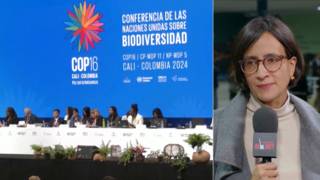
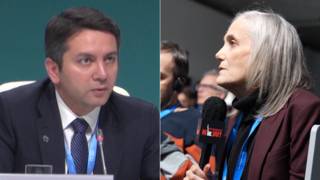
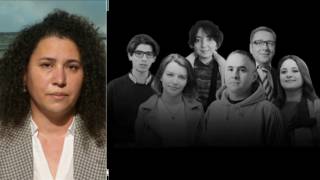
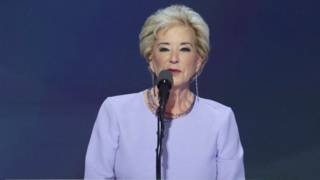





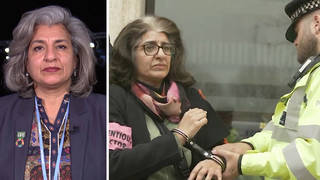
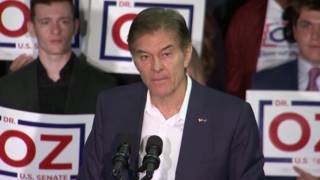
Media Options